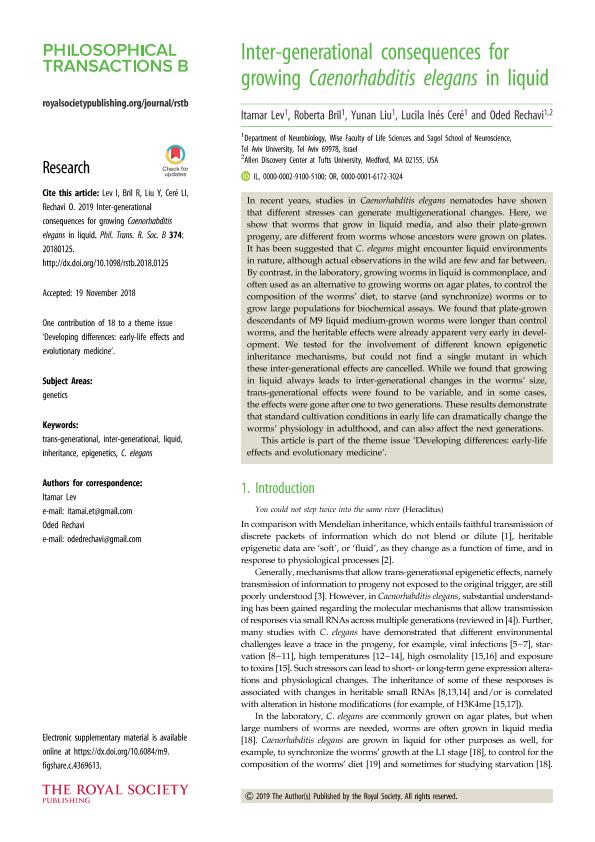Mostrar el registro sencillo del ítem
dc.contributor.author
Lev, Itamar

dc.contributor.author
Bril, Roberta
dc.contributor.author
Liu, Yunan
dc.contributor.author
Ceré, Lucila Inés

dc.contributor.author
Rechavi, Oded

dc.date.available
2020-12-16T21:05:50Z
dc.date.issued
2019-04
dc.identifier.citation
Lev, Itamar; Bril, Roberta; Liu, Yunan; Ceré, Lucila Inés; Rechavi, Oded; Inter-generational consequences for growing Caenorhabditis elegans in liquid; The Royal Society; Philosophical Transactions of the Royal Society B: Biological Sciences; 374; 1770; 4-2019; 1-8; 20180125
dc.identifier.issn
0962-8436
dc.identifier.uri
http://hdl.handle.net/11336/120653
dc.description.abstract
In recent years, studies in Caenorhabditis elegans nematodes have shown that different stresses can generate multigenerational changes. Here, we show that worms that grow in liquid media, and also their plate-grown progeny, are different from worms whose ancestors were grown on plates. It has been suggested that C. elegans might encounter liquid environments in nature, although actual observations in the wild are few and far between. By contrast, in the laboratory, growing worms in liquid is commonplace, and often used as an alternative to growing worms on agar plates, to control the composition of the worms’ diet, to starve (and synchronize) worms or to grow large populations for biochemical assays. We found that plate-grown descendants of M9 liquid medium-grown worms were longer than control worms, and the heritable effects were already apparent very early in development. We tested for the involvement of different known epigenetic inheritance mechanisms, but could not find a single mutant in which these inter-generational effects are cancelled. While we found that growing in liquid always leads to inter-generational changes in the worms’ size, trans-generational effects were found to be variable, and in some cases, the effects were gone after one to two generations. These results demonstrate that standard cultivation conditions in early life can dramatically change the worms’ physiology in adulthood, and can also affect the next generations. This article is part of the theme issue ‘Developing differences: early-life effects and evolutionary medicine’.
dc.format
application/pdf
dc.language.iso
eng
dc.publisher
The Royal Society

dc.rights
info:eu-repo/semantics/openAccess
dc.rights.uri
https://creativecommons.org/licenses/by/2.5/ar/
dc.subject
C. ELEGANS
dc.subject
EPIGENETICS
dc.subject
INHERITANCE
dc.subject
INTER-GENERATIONAL
dc.subject
LIQUID
dc.subject
TRANS-GENERATIONAL
dc.subject.classification
Genética y Herencia

dc.subject.classification
Ciencias Biológicas

dc.subject.classification
CIENCIAS NATURALES Y EXACTAS

dc.title
Inter-generational consequences for growing Caenorhabditis elegans in liquid
dc.type
info:eu-repo/semantics/article
dc.type
info:ar-repo/semantics/artículo
dc.type
info:eu-repo/semantics/publishedVersion
dc.date.updated
2020-11-19T21:49:16Z
dc.identifier.eissn
1471-2970
dc.journal.volume
374
dc.journal.number
1770
dc.journal.pagination
1-8; 20180125
dc.journal.pais
Reino Unido

dc.journal.ciudad
Londres
dc.description.fil
Fil: Lev, Itamar. Universitat Tel Aviv; Israel
dc.description.fil
Fil: Bril, Roberta. Universitat Tel Aviv; Israel
dc.description.fil
Fil: Liu, Yunan. Universitat Tel Aviv; Israel
dc.description.fil
Fil: Ceré, Lucila Inés. Consejo Nacional de Investigaciones Científicas y Técnicas. Centro Científico Tecnológico Conicet - Rosario. Instituto de Fisiología Experimental. Universidad Nacional de Rosario. Facultad de Ciencias Bioquímicas y Farmacéuticas. Instituto de Fisiología Experimental; Argentina. Universitat Tel Aviv; Israel
dc.description.fil
Fil: Rechavi, Oded. Universitat Tel Aviv; Israel. Tufts University; Estados Unidos
dc.journal.title
Philosophical Transactions of the Royal Society B: Biological Sciences

dc.relation.isreferencedin
info:eu-repo/semantics/reference/doi/https://dx.doi.org/10.6084/m9.figshare.c.4369613
dc.relation.alternativeid
info:eu-repo/semantics/altIdentifier/doi/http://dx.doi.org/10.1098/rstb.2018.0125
dc.relation.alternativeid
info:eu-repo/semantics/altIdentifier/url/https://royalsocietypublishing.org/doi/10.1098/rstb.2018.0125
Archivos asociados
